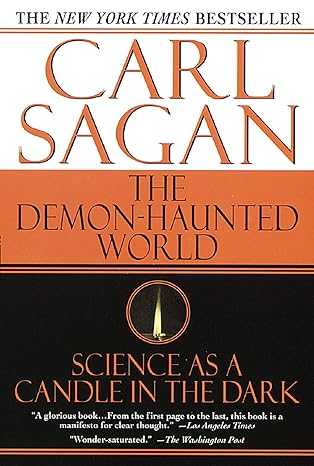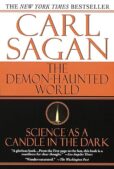Advice from a Dead Astronomer
Carl Sagan the astronomer, exobiology pioneer, and advocate of skeptical scientific inquiry died in December of 1996. His book, The Demon Haunted World: Science as a Candlestick in the Dark, was published earlier that year. In the book Sagan addressed many of the thinking problems facing today’s world.

The back cover presents the challenge that Sagan undertook: “How can we make intelligent decisions about our increasingly technology-driven lives if we don’t understand the differences between the myths of pseudoscience, New Age thinking, and fundamentalist zealotry and the testable hypotheses of science.”
His focus was on the huge number of people who are scientific illiterates. Because of a lack of understanding of basic scientific concepts and facts, these people are more likely to accept unverified claims, conspiracy theories, or pseudoscientific notions.
His concern was science. My concern is the number of people who are thinking-illiterate – those who lack the basic skills essential for effective reasoning, problem-solving, and decision making. Without critical thinking skills or the willingness to use them, individuals are more likely to accept false or misleading information, fall prey to propaganda, and be influenced by biased or manipulative arguments.
Where Sagan fits.
You may have noticed a theme running through recent issues of our MindPrep Journal. These issues were entitled:
- They Are Trying to Bend Your Mind (12/18/23)
- Deception Through the Years (1/8/24)
- The Institute for Propaganda Analysis (1/14/24)
To be blunt, I’m concerned about the quality of thinking we’re seeing today.
- Our politicians no longer debate issues – they defend or attack “positions.” (Side note: The U.S. Office of Technology Assessment was eliminated by Congress in 1995. I guess our political leaders know all they need to know about science. Sagan wrote “The last scientifically literate President may have been Thomas Jefferson.”)
- Social media platforms have become weapons of mass distraction. Many of us, especially our younger citizens, are succumbing to the “shallows,” to quote Nicholas Carr (The Shallows: What the Internet is doing to Our Brains, 2011). It seems we don’t dig into issues; we let “factoids” and influencers direct our thinking. Is the internet and social media eroding our ability for deep thinking, contemplation, and reflection? Carr argues that it’s turning us into superficial thinkers.
- Genuine research is in danger of being displaced by asking questions of ChatGPT or other AI applications. If we let Chat give us quick answers what will become of human curiosity and the building of human knowledge?
- Etc. Etc.
Sagan died before the internet, social media, and artificial intelligence permeated society. Nonetheless, his concerns from “the old days” certainly apply today.
He was also a gentleman. So, he simply referred to the danger of succumbing to “baloney.” And he did us a service by defining some of the essential elements of a Baloney Detection Kit. The contents of the kit are some tools for skeptical thinking.
“What skeptical thinking boils down to is the means to construct and to understand a reasoned argument and – especially important – to recognize a fallacious or fraudulent argument. The question is not whether we like the conclusion that emerges out of a train of reasoning, but whether the conclusion follows from the premise or starting point and whether that premise is true.”
The following are some of the things we should do to escape the clutches of the baloney we are fed daily.
Baloney Detection
Here are six of the actions that Sagan suggests.
- Encourage and participate in substantive debate on the evidence of all points of view. (When was the last time you witnessed an actual political debate?)
- Dismiss the idea of submitting to “authorities” and rely, instead, on experts. (The recent Covid-19 pandemic was rife with non-medical “authorities” telling us what to do. I hope you didn’t gargle with bleach but listened to the Mayo Clinic experts instead.)
- Build and examine multiple hypotheses. If there is something to be explained and understood, examine all the ways in which it could be explained. (The current interest in UFOs is in danger of succumbing to one-sided media hype.)
- Don’t become overly attached to your own hypothesis. It’s merely a “waystation” in your pursuit of real knowledge. (What’s your hypothesis about the value of electric vehicles? Might there be another?)
- Quantify! Opinions are interesting but demand evidence. (What’s the evidence regarding climate change? Did the recent cold snap negate the argument for global warming?)
- If there is a chain of argument, every link in the chain must work, including the premise. (People who eat lots of carrots have perfect eyesight. Bill eats lots of carrots. Bill has perfect eyesight. Oops, bad premise.)
Bottom Line
Misinformation, disinformation, outright lies, and conspiracy theories fill our lives and our media. It’s our responsibility to search for truth. It’s not an easy job. But who will do it if we don’t?
Never miss out!
Get an email update every time I publish new content. Be the first to know!

